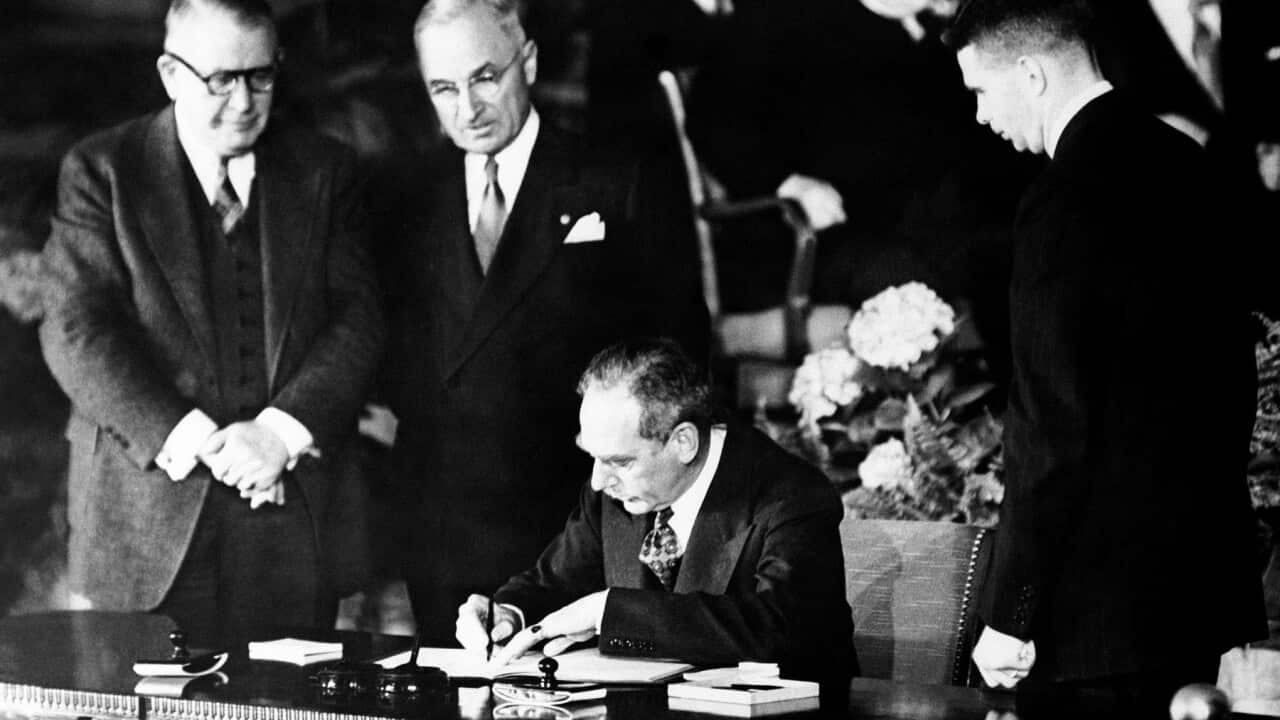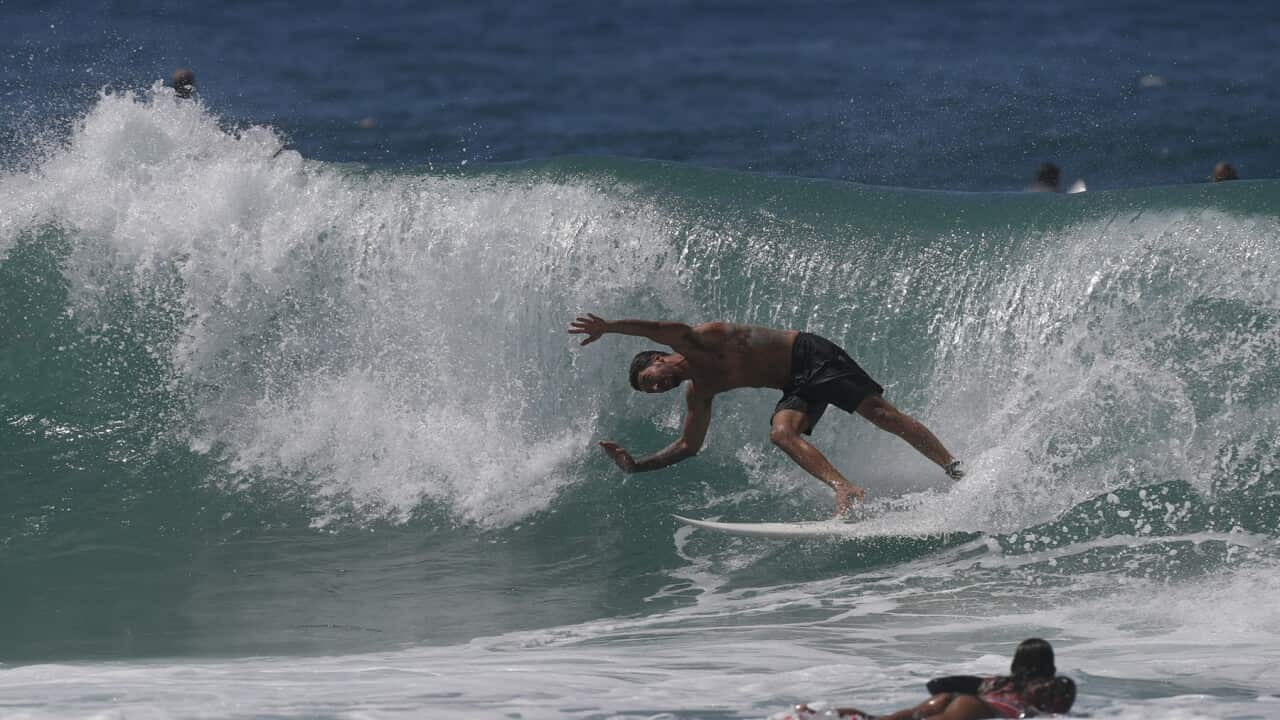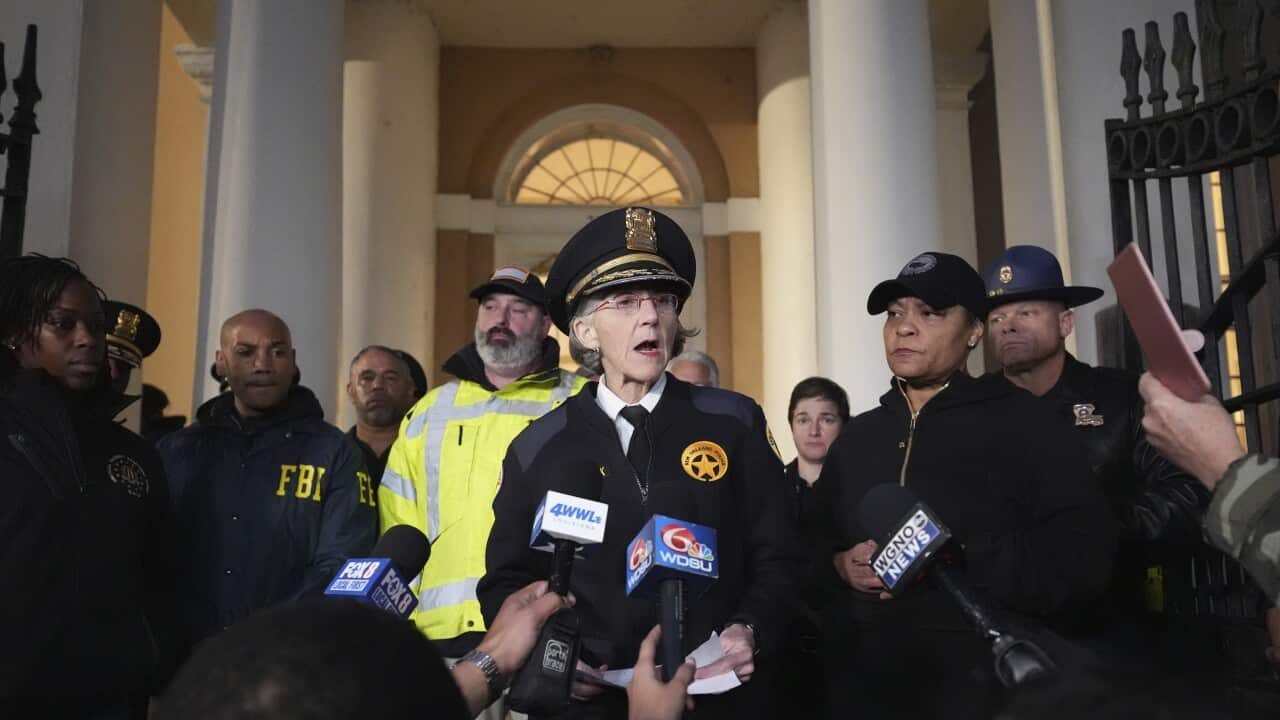English
On the 4th of April, NATO celebrates 75 years since its formation.
US President at the time, Harry Truman, and representatives from 11 other countries signed the agreement in 1949, officially forming the alliance.
"This treaty is a simple document. The nations which sign it agree to abide by the peaceful principles of the United Nations. To maintain friendly relations and economic cooperation with one another. To consult together whenever the territory or independence of any of them is threatened. And to come to the aid of any one of them who may be attacked. If there is anything certain today, if there is anything inevitable in the future, it is the will of the people of the world for freedom and for peace."
NATO was founded to promote collective defence and security among its member countries, primarily in response to the emerging Cold War.
Today, largely due to Russia's invasion of Ukraine, NATO has accepted two more members, most recently welcoming Finland, and last month, Sweden to the alliance.
This is Swedish Prime Minister Ulf Kristersson.
"It feels very good today. I have to say. It is a major step. That's a very natural step. So kind of we today, we actually, in a literal sense, made Sweden safer and more secure. And I'm proud to be the prime minister, I've had the job and the duty to to fulfill that."
The accession of Sweden, which has not been at war since 1814, and Finland is the most significant expansion of the alliance since it took in members from eastern Europe after the Soviet Union collapsed in 1991.
Sweden and Finland's accession is seen by many as a blow for Russian President Vladimir Putin, who has sought to prevent any further strengthening of the alliance.
US President Joe Biden says he warned President Putin that invading Ukraine would only strengthen NATO.
"Putin thought he could break us apart. When this all started, he believed he could break us apart, in my view. Weaken our resolve. Instead, he's getting exactly what he did not want. He wanted the Finlandisation of NATO, but he's getting the NATOisation of Finland, along with Sweden. ... Before the war started, I told Putin that if he invaded Ukraine, NATO would not only get stronger but would get more united. And we would see democracies of the world stand up and oppose his aggression and defend the rules-based order. That's exactly what we're seeing today."
Just last week, President Putin warned Ukraine's western allies, that if the West supplies F-16 fighters to Ukraine then they will be shot down by Russian forces.
“If they deliver F-16s, and they are talking about it and apparently training pilots for them, I think you understand it like no one else, better than anyone, it won’t change the situation on the battlefield. We will destroy their warplanes just as we destroy their tanks, armoured vehicles and other equipment, including multiple rocket launchers. ... Of course, if they are used from air bases of third countries, they will become a legitimate target for us wherever they are. F-16s are capable of carrying nuclear weapons, and we will also need to take that into account while organising our combat operations.”
Admiral Rob Bauer is Chair of NATO's Military Committee:
“There are no indications that Russia is going to attack any nation of the alliance. So, I do not think there is an immediate threat. That's not the issue here. The issue is that Russia has larger ambitions than Ukraine. We know that. And therefore, the alliance as a whole needs to be 'readier' because we agreed to see Russia as a threat, like the terrorist organisations. And basically, then we changed our military plans, refocusing on collected defence. And that is what we have done. And the plans have been agreed in Vilnius. And now all the work that we do is to make sure that we can deter and defend against those two threats”.
According to analysts, NATO has other challenges, including the transformation of NATO forces to refocus on defending against any Russian attack, after decades in which NATO concentrated on missions beyond its borders, such as in Afghanistan and the Balkans.
NATO will also have to manage differences over how involved it should become in Asia, with the United States pushing for a greater role in countering China, while others such as France insist NATO must maintain focus on the North Atlantic area.
Robert Benson is senior policy analyst for national security and international policy at the Centre for American Progress.
He says NATO's 75-year existence has been a tool for peace.
"The history of Europe has been one of well, perpetual conflict. Up until the realisation of NATO 75 years ago, in 1949, which has maintained a really durable peace within the Euro-Atlantic zone -- so, I think that to me more than anything else is the historic nature of the accomplishment."
Italian
Il 4 aprile la NATO festeggia i 75 anni dalla sua formazione.
L'allora presidente degli Stati Uniti, Harry Truman, e i rappresentanti di altri 11 Paesi firmarono l'accordo nel 1949, formando ufficialmente l'alleanza.
"This treaty is a simple document. The nations which sign it agree to abide by the peaceful principles of the United Nations. To maintain friendly relations and economic cooperation with one another. To consult together whenever the territory or independence of any of them is threatened. And to come to the aid of any one of them who may be attacked. If there is anything certain today, if there is anything inevitable in the future, it is the will of the people of the world for freedom and for peace."
La NATO è stata fondata per promuovere la difesa collettiva e la sicurezza tra i Paesi membri, principalmente in risposta all'emergere della guerra fredda.
Oggi, soprattutto a causa dell'invasione dell'Ucraina da parte della Russia, la NATO ha accettato altri due membri, accogliendo recentemente nell'alleanza la Finlandia e, il mese scorso, la Svezia.
Ecco il primo ministro svedese Ulf Kristersson.
"It feels very good today. I have to say. It is a major step. That's a very natural step. So kind of we today, we actually, in a literal sense, made Sweden safer and more secure. And I'm proud to be the prime minister, I've had the job and the duty to to fulfill that."
L'adesione della Svezia, che non è mai stata in guerra dal 1814, e della Finlandia rappresenta l'espansione più significativa dell'alleanza da quando ha accolto Paesi dell'Europa orientale dopo il crollo dell'Unione Sovietica nel 1991.
L'adesione di Svezia e Finlandia è vista da molti come un colpo per il presidente russo Vladimir Putin, che ha cercato di impedire qualsiasi ulteriore rafforzamento dell'alleanza.
Il Presidente degli Stati Uniti Joe Biden ha dichiarato di aver avvertito il Presidente Putin che l'invasione dell'Ucraina avrebbe solo rafforzato la NATO.
"Putin thought he could break us apart. When this all started, he believed he could break us apart, in my view. Weaken our resolve. Instead, he's getting exactly what he did not want. He wanted the Finlandisation of NATO, but he's getting the NATOisation of Finland, along with Sweden. ... Before the war started, I told Putin that if he invaded Ukraine, NATO would not only get stronger but would get more united. And we would see democracies of the world stand up and oppose his aggression and defend the rules-based order. That's exactly what we're seeing today."
Proprio la settimana scorsa, il Presidente Putin ha avvertito gli alleati occidentali dell'Ucraina che se l'Occidente fornirà caccia F-16 all'Ucraina, questi saranno abbattuti dalle forze russe.
“If they deliver F-16s, and they are talking about it and apparently training pilots for them, I think you understand it like no one else, better than anyone, it won’t change the situation on the battlefield. We will destroy their warplanes just as we destroy their tanks, armoured vehicles and other equipment, including multiple rocket launchers. ... Of course, if they are used from air bases of third countries, they will become a legitimate target for us wherever they are. F-16s are capable of carrying nuclear weapons, and we will also need to take that into account while organising our combat operations.”
L'ammiraglio Rob Bauer è presidente del Comitato militare della NATO:
“There are no indications that Russia is going to attack any nation of the alliance. So, I do not think there is an immediate threat. That's not the issue here. The issue is that Russia has larger ambitions than Ukraine. We know that. And therefore, the alliance as a whole needs to be 'readier' because we agreed to see Russia as a threat, like the terrorist organisations. And basically, then we changed our military plans, refocusing on collected defence. And that is what we have done. And the plans have been agreed in Vilnius. And now all the work that we do is to make sure that we can deter and defend against those two threats”.
Secondo gli analisti, la NATO deve affrontare altre sfide, tra cui la trasformazione delle sue forze per concentrarsi nuovamente sulla difesa da qualsiasi attacco russo, dopo decenni in cui si è concentrata su missioni al di fuori dei propri confini, come in Afghanistan e nei Balcani.
La NATO dovrà anche gestire le differenze sul suo coinvolgimento in Asia, con gli Stati Uniti che spingono per un ruolo più forte nel contrastare la Cina, mentre altri, come la Francia, insistono sul fatto che la NATO deve mantenere l'attenzione sull'area del Nord Atlantico.
Robert Benson è senior analist per la sicurezza nazionale e la politica internazionale presso il Centre for American Progress.
Benson afferma che i 75 anni di esistenza della NATO sono stati uno strumento di pace.
"The history of Europe has been one of well, perpetual conflict. Up until the realisation of NATO 75 years ago, in 1949, which has maintained a really durable peace within the Euro-Atlantic zone -- so, I think that to me more than anything else is the historic nature of the accomplishment."




